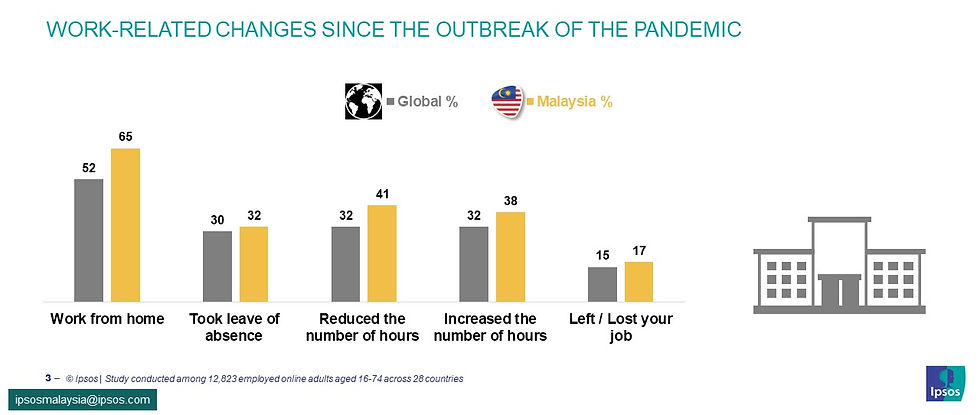The Impact of the COVID-19 Pandemic on the Malaysian Workforce
- Editor MWAW

- Jan 22, 2021
- 3 min read

"The pandemic has brought considerable disruption to the life of employees across the world. However, the negative effects of the pandemic related changes are uneven. Female employees are more likely to be impacted by the changes than their male colleagues. People under 35 and lower income employees feel more anxiety and stress related to job security. Business owners/Decisions makers face much pressure on the choices that they make." - Arun Menon, Managing Director, IPSOS Malaysia
The latest study by IPSOS revealed that Malaysia has more people working from home than the global average. More than 1/3 of Malaysians had to take leave of absence and either reduce or increase their number of hours since the outbreak. 17% of Malaysians claim to have left or lost their job. The study was conducted among a total of 12,823 employed online adults aged 16-74 across 28 countries.
According to Arun Menon, Managing Director of IPSOS Malaysia, as Malaysia settles into another movement control order (MCO), 2/3 of Malaysians are claiming to be working from home. "Even after 9 months of working from home, a majority still struggle to cope with the balance of work life, inadequacy of home setup, and severe loneliness/isolation," he adds.
What are the factors that have impacted Malaysian employees in comparison to their global peers? Arun stated three: anxiety related to job security, family pressure and stress due to change in routine.
Work-related Changes Since the Outbreak of the Pandemic
Malaysia recorded a high number of people working from home (65%) in comparison to the global average (52%). More than a third (30%) of Malaysian had to take a leave of absence whereas 32% either had to reduce or increase their working hours since the outbreak. A total of 17% Malaysians have claimed to have lost their job in comparison to the global average (15%).

High Level of Anxiety and Stress in the Workforce
It was noted that increased anxiety with regards to job security has been a common experience; about 74% of Malaysians have experienced such emotions. Malaysians report the highest level of anxiety among the 28 countries that have been surveyed for the study. Women, people below 35 years of age and lower income employees experience the negative effects significantly more than the rest.

Struggling to Find Work/Life Balance Working From Home
Let's face it - work-life balance is a challenge for us all. About 63% of Malaysian employees found it difficult in finding a work-life balance. More than half of the homes of employees are unequipped to get work done and more than half of the employees feel lonely and isolated working from home.

Note: These are the results of a 28-country survey conducted by Ipsos on its Global Advisor online platform between Nov-Dec’2020 in Argentina, Australia, Belgium, Brazil, Canada, Chile, China (mainland), Colombia, France, Germany, Great Britain, Hungary, India, Italy, Japan, Malaysia, Mexico, the Netherlands, Peru, Poland, Russia, Saudi Arabia, South Africa, South Korea, Spain, Sweden, Turkey, and the United States.
The sample consists of employed individuals. The sample size ranges from n=249 in Sweden to n=801 in China with an average of 458 per country. Weighting has been employed to balance demographics and ensure that the composition of each country’s sample reflects that the adult population according to the most recent census data. The publication of these findings abides by local rules and regulations.
Source: IPSOS Malaysia





Comments